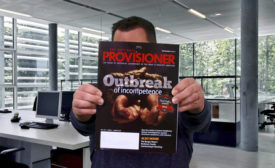Home » Keywords: » foodborne illness outbreak
Items Tagged with 'foodborne illness outbreak'
ARTICLES
Listeria attorneys at Marler Clark call for food safety measures to protect the public.
Read More
2019 Food Safety Report | Consultants Corner
2019 Food Safety Report: Outbreak of incompetence
How the nation's foodborne-illness investigations system is broken, jeopardizing the health and safety of consumers and the industry.
Read More
Stay ahead of the curve. Unlock a dose of cutting-edge insights.
Receive our premium content directly to your inbox.
SIGN-UP TODAYCopyright ©2025. All Rights Reserved BNP Media.
Design, CMS, Hosting & Web Development :: ePublishing










